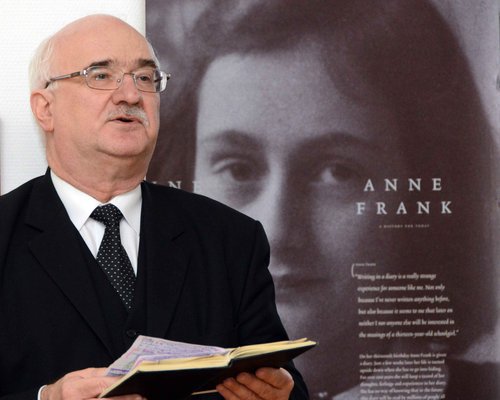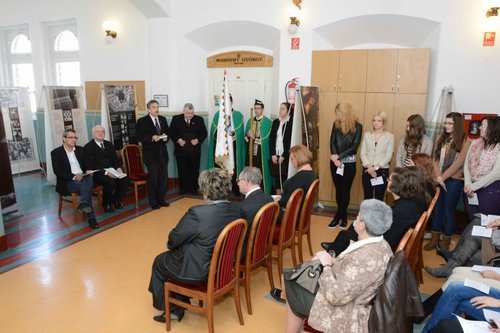The exhibition points out the dangers of human evil and intolerance. Derencsényi emphasized that we should hear what history wants to teach us and we should be ready for remembrance and reminder.
At the opening of the exhibition, director of Dóczy High School, Bálint Korsós, underlined that the diary of Anna Frank was a decisive and harrowing experience for him. He trusts that the exhibition will influence other people to read her account as well.

Zsolt Heller, chairman of the Foundation for the Jewish Church and Cemetery of Debrecen, opened the exhibition. In his speech he emphasized that Anne’s story can justly raise the question: how is it possible that other people pass judgment on others? We do not have the right to do this!
He also said that everybody has a diary at least in his mind. We can tell everything to our diary, even our deepest secrets, which we do not want to share with any other because we are afraid of what they will think about us. But we do not have to be ashamed of our thoughts and feelings. They can become important for someone else years later. That is what Anne’s Diary proves.

Material for the exhibition was collected by the Anne Frank House of Amsterdam, and according to its special method, visitors are guided by contemporary guides in an interactive way. This method works really well in several countries. With a contemporary guide, students can understand the theme easier and think deeper on the message of the exhibition.
The exhibition is organized along a timeline: above the timeline you can see the life of Anne, and underneath the story of the Second World War. Visitors can read selections from the diary and know the era in which Anne lived with the help of Frank family photos, personal stories and eyewitness reports.
Displays show Anne’s life-story based on her diary, published by her father in 1947, and that from her life young people can still learn something today. The aim of the exhibition is to point out the importance of standing up against prejudice, the preservation of freedom, upholding human rights and standing for the democratic society.
The “Anne Frank- History for Today” exhibition has been traveling around the world since 1997. It has been visited by more than 10 million people in 60 countries, and for the first time arrived to Hungary in 2007 at the Holocaust Memorial Center in Budapest.
reformatus.hu
sources: debrecen.hu, mazsihisz.hu, prea.hu, bethleniskola.hu